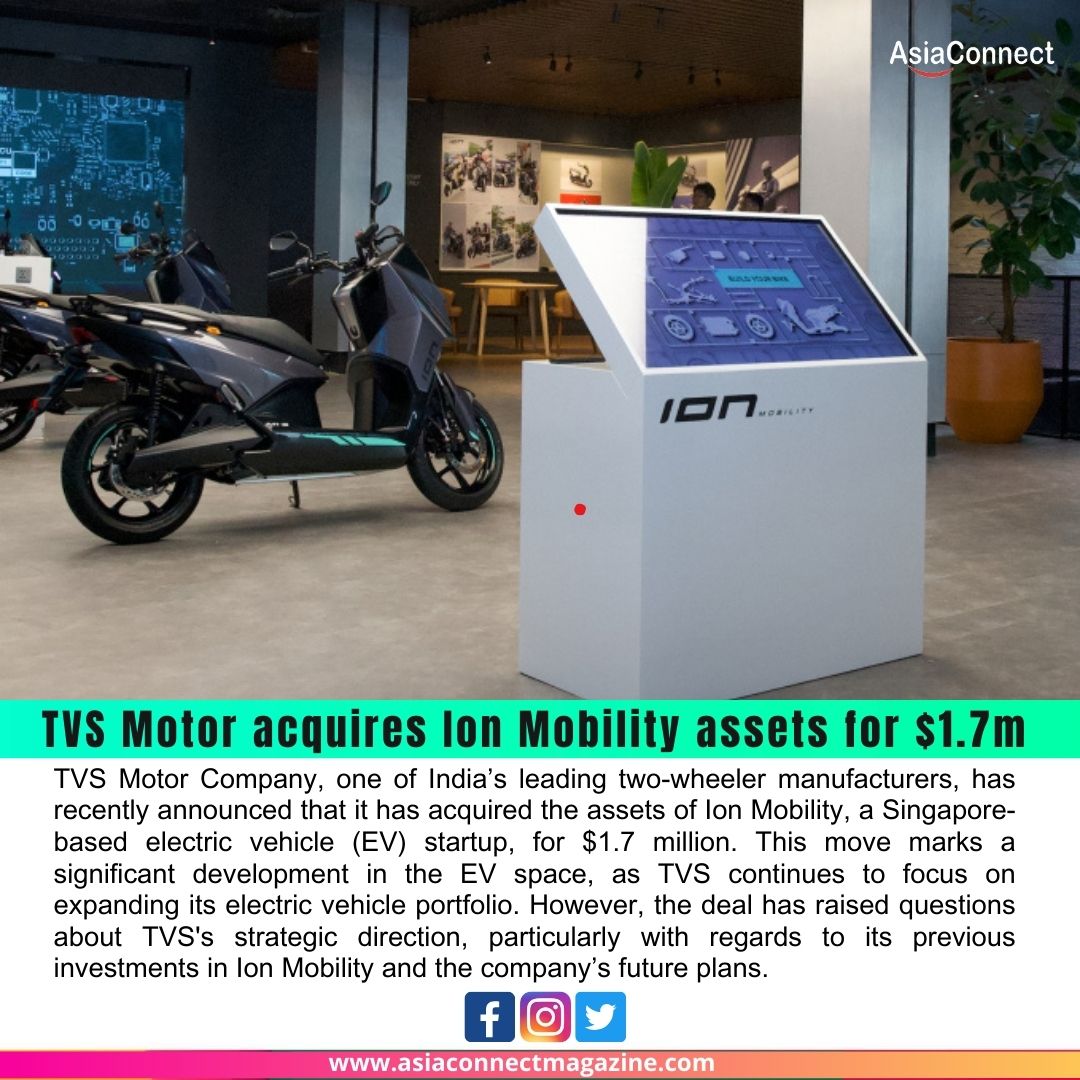TVS Motor Company, one of India’s leading two-wheeler manufacturers, has recently announced that it has acquired the assets of Ion Mobility, a Singapore-based electric vehicle (EV) startup, for $1.7 million. This move marks a significant development in the EV space, as TVS continues to focus on expanding its electric vehicle portfolio. However, the deal has raised questions about TVS’s strategic direction, particularly with regards to its previous investments in Ion Mobility and the company’s future plans.
Background of the Deal
The deal comes after TVS Motor revealed that it had divested its stake in Ion Mobility, a company that was once seen as a potential partner for TVS in the EV space. While TVS did not specify the buyer of Ion Mobility’s assets, the move is seen as an important step in TVS’s evolving strategy towards electric mobility.
Ion Mobility, founded in 2020, had been focused on developing electric scooters and other electric mobility solutions. The company had aimed to revolutionize the electric two-wheeler market in Southeast Asia, specifically targeting the growing demand for sustainable transportation solutions. However, despite its promising start, Ion Mobility has struggled with several challenges related to product development, funding, and scaling its operations.
TVS Motor’s decision to acquire Ion Mobility’s assets for a relatively modest sum of $1.7 million could signal a strategic shift. The company, known for its diverse two-wheeler portfolio, has made significant strides in the electric vehicle market with its models like the TVS iQube. By acquiring Ion Mobility’s assets, TVS may be looking to further strengthen its EV offerings and leverage the intellectual property, technology, and expertise developed by Ion Mobility.
What Does This Mean for TVS Motor?
For TVS, the acquisition represents an opportunity to expand its presence in the electric two-wheeler market. As the demand for electric vehicles continues to rise, particularly in India and Southeast Asia, TVS is positioning itself as a key player in the EV sector. The company has already made substantial investments in its electric vehicle segment, and acquiring Ion Mobility’s assets provides it with an additional technological edge.
However, the deal also raises questions about TVS’s earlier investment strategy. The fact that the company did not specify the buyer or whether any of its prior investments in Ion Mobility have been written off could indicate that the initial partnership did not yield the expected results. It’s possible that TVS Motor sees greater value in the assets of Ion Mobility, particularly its research and development capabilities, than in the company itself.
Ion Mobility’s Challenges and TVS’s Strategic Shift
Ion Mobility, while initially seen as a promising player in the electric two-wheeler space, has faced challenges in bringing its products to market. Reports suggest that the startup struggled with production delays, funding shortfalls, and operational hurdles, which made scaling its business a difficult proposition. These challenges likely played a role in TVS’s decision to acquire only the assets of Ion Mobility rather than continue its stake in the company.
For TVS, this acquisition could be seen as a way to access the intellectual property and technology developed by Ion Mobility without taking on the risks associated with the company’s ongoing struggles. By focusing on the assets rather than the entire company, TVS may be able to integrate valuable technology into its own operations and accelerate the development of its electric vehicles.
Conclusion
TVS Motor’s acquisition of Ion Mobility’s assets for $1.7 million is a significant move in the company’s ongoing efforts to strengthen its position in the electric vehicle market. While the deal marks a shift in TVS’s investment strategy, it also highlights the challenges that startups like Ion Mobility face in the rapidly evolving EV sector. As TVS continues to build on its electric mobility vision, this acquisition could play a key role in its long-term success. However, the full implications of this deal, particularly regarding any write-offs from TVS’s earlier investments, remain to be seen.





